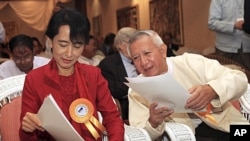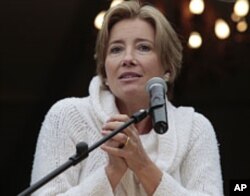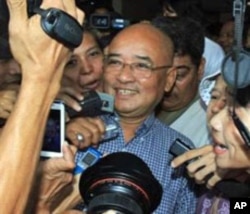Twelve months after Burmese democracy leader Aung San Suu Kyi was released from house arrest, a new government has begun talking to some of its critics. ActionAid, a charity working in Burma, says the opportunity to advance reforms should be seized. But outside the major cities, ethnic minority groups say the suppression of their people is only getting worse.
It’s a year since opposition leader Aung San Suu Kyi was released from seven years of house arrest - to rapturous cheers from thousands of supporters who had gathered outside her Rangoon home.
Her opposition to Burma’s military rulers had seen her spend 15 of the previous 21 years in detention.
The nominally civilian government has opened a tentative dialogue with Aung San Suu Kyi. Some observers say this offers the best chance in decades to advance democratic reform.
British actress Emma Thompson recently traveled to Burma with the charity ActionAid, and met Aung San Suu Kyi. “She’s very cautious but optimistic," she said. "The phrase she used to me about what was happening now was, ‘it is very important that we do not proceed with indecent haste.'"
Thompson was left with optimistic impressions from her visit.
“I did see poverty of course," she said. "Deep, wrenching poverty. But I did not feel that there was a generation of people there too scared to move forward and inhabit the space that appears to be appearing. I felt that there was a dialogue, a genuine dialogue beginning to start between a very difficult government and the people.”
Families show their emotion as hundreds of political prisoners are freed from the notorious Insein jail last month. ActionAid says this is a sign that the regime is beginning to open up.
But not all Burmese share the optimism.
As a teenager Zoya Phan was forced to flee her ethnic Karen village in the east of Burma as it was attacked by the military. She eventually escaped to Britain and now works for the human rights group, the Burma Campaign UK.
“The only things that have changed in ethnic areas are the massive human rights violations, increased conflict, and the use of rape as a weapon of war by the regime has increased significantly. And the human rights situations are getting worse and worse every day," said Zoya Phan.
Phan says last year’s elections - which Western governments claim were rigged to ensure victory by the military's allies - were part of a diplomatic calculation by the outgoing generals.
“The whole process of the elections last year was designed to continue their military rule and now they are opening up a little bit of political space because they are exercising public relations, they want the ASEAN chairmanship in 2012 and they want international sanctions to be lifted,” she said.
Everywhere she goes, Aung San Suu Kyi attracts thousands of supporters. She has indicated she may re-register her party, the National League for Democracy, if the government amends certain election laws. That could see her stand for election.
While that may represent Burma’s best hope for real reform, observers like Zoya Phan say the military is not about to give up its hold on power.


















